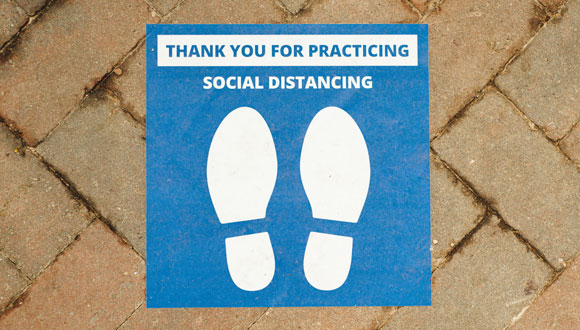4 Reasons You Should Still Be Taking Social Distancing Seriously
June 18, 2020 - Katie McCallumThe COVID-19 pandemic has presented a unique set of challenges for each of us. But one enormous challenge we're all adjusting to is the complete shift in the way we interact with one another.
Social distancing isn't easy, but it is effective.
After a few months of feeling inconvenienced day after day (after day), you may need a reminder of how important social distancing is. Here are four reasons you should still be taking social distancing very seriously.
We're not done "flattening the curve"
Since the start of the COVID-19 pandemic, we've all heard about the importance of flattening the curve, with social distancing being the primary way to achieve this. But our need to flatten the curve didn't end as restrictions began to ease and businesses began to reopen.
The new coronavirus will be among us for some time, and a flat curve doesn't stay flat if we don't remain committed to the measures and precautions that got us there in the first place.
And keeping the curve flat is critical for our communities. It helps ensure that plenty of health care workers, hospital beds and ICUs remain available as individuals seek treatment for medical conditions that didn't just vanish because a pandemic began. It helps ensure that businesses can remain open safely. And it helps ensure the situation doesn't get so out of hand that those inconvenient, restrictive orders are put back into place again.
The reality is that flattening the curve is an active, continuous process — an ever-present goal that each of us must take into account while making decisions every single day.
To stay up-to-date on Houston's current progress to flatten the curve, view the daily new COVID-19 cases in the Greater Houston area.
The virus can spread from person-to-people
By now, you're familiar with how the virus spreads. If you're infected and cough, clear your throat or even speak, you may potentially spread the virus to someone that's nearby.
While we hear a lot about "person-to-person" spread, it's important to understand that a person can infect more than just one other person. In fact, on average, an infected individual spreads the new coronavirus to two to three other people.
And, given the right conditions, an infected person can spread the virus to more than just three people.
For instance, a CDC report analyzing community spread in Chicago, Illinois found that a single individual initiated a cluster of 16 COVID-19 cases after attending two extended family gatherings, a funeral and a birthday party. Unfortunately, this cluster of cases resulted in three deaths.
As a second example, another CDC report analyzing several COVID-19 cases traced back to a restaurant in Guangzhou, China found that a single individual infected four other people at the table, as well as at least one guest at each of the neighboring tables on either side (and potentially up to five people at the neighboring tables).
These examples demonstrate the chain reaction of COVID-19 cases that can occur if just one person with the virus ignores social distancing guidelines during the COVID-19 pandemic.
You can spread the virus without knowing it
We're still learning more and more about coronavirus every single day, but public health officials continue to warn that you don't actually have to be exhibiting symptoms to spread the new coronavirus.
A person infected with the virus can be contagious as early as three days before he or she begins showing symptoms. In addition, some people never develop symptoms, but are still able to spread the virus.
In fact, the individual from the restaurant in Guangzhou, China mentioned above was pre-symptomatic when he or she sat down to eat lunch and inadvertently infected at least six other people. And before attending both the funeral and birthday party, the individual from Chicago had recently traveled but was experiencing only very mild respiratory symptoms.
This means that, even if you "feel fine," you can still inadvertently spread the virus if you're infected and don't yet know it — further emphasizing the need for everyone to practice social distancing.
Social distancing is your social responsibility
The COVID-19 pandemic has placed a new level of personal accountability in front of each of us. To slow the spread of coronavirus and protect the health and vitality of our communities, we must each remain committed to the extra precautions our public health officials are recommending.
At the core of these preventive measures is the need for continued social distancing — even if you're healthy.
While it can feel inconvenient, social distancing doesn't have to mean social isolation. Fortunately, we live in a time full of digital tools and resources that can help us stay connected. From video calls to online games, there are plenty of ways to socialize with your friends and loved ones without potentially contributing to the spread of COVID-19.
And we must also remember to pair social distancing with other precautions, including:
- Wearing a mask in public
- Practicing proper hand washing and cough etiquette
- Thinking twice before visiting vulnerable loved ones, especially if you've recently dined at a restaurant or traveled for vacation or work
- Knowing the steps the steps to take if you think you may have COVID-19
It can be tempting to throw caution the wind and ignore both how this virus spreads and how contagious it is. But, at the end of the day, the new coronavirus is still here — and it's each of our responsibilities to protect ourselves, each other and our communities for as long as this pandemic lasts.
Concerned you may have COVID-19?
- If you're experiencing COVID-19 symptoms, you can speak to a Virtual Urgent Care provider 24/7. The provider will help you determine if testing is needed and advise you on where you should go.


